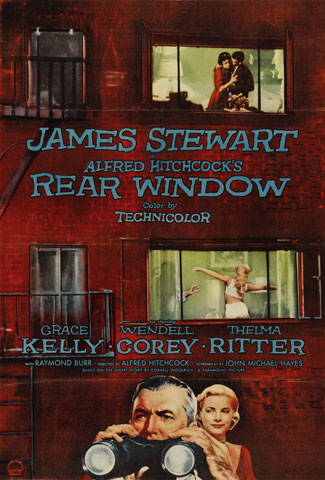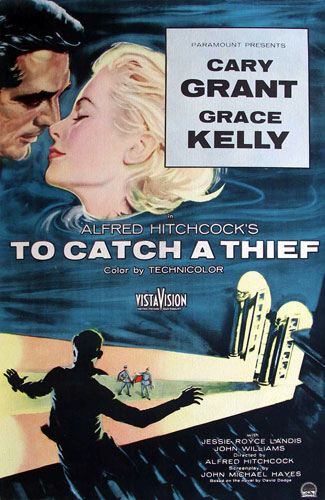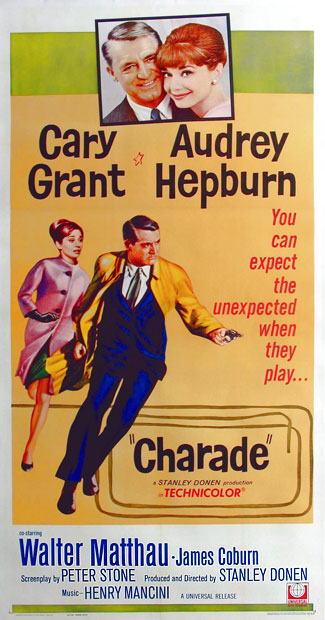Triple Feature Feature
by Cosmo Brown
For this first column of classic Hollywood movie reviews, I wanted to pick movies that combine universal appeal with awesomeness. Because who can deny the appeal of that which is awesome? The only problem is that, while I have picked three top-notch, awesome movies, I find myself at something of a loss of words about them. For one, I don't think mere words can express the height of their awesomeness (yes, they're that good). For another, these are some pretty popular movies by popular directors and starring popular performers; a lot of words have already been used about these movies, so I fear my voice isn't going to add much to the volume.
However, I should try to say something about these movies and why you, friend of The Wizarding Times, should go out and see these movies for yourself. So, if you'll forgive my very inadequate words, I'll try to tell you a little something about Rear Window, To Catch a Thief, and Charade.
(And, if you're very nice, I'll try and hold off on using "awesome" for the rest of this article. Unless, of course, I can't think of another word.;))
Rear Window (1954)
(Directed by Alfred Hitchcock. Starring James Stewart, Grace Kelly, Raymond Burr, and Thelma Ritter.)
 Alfred Hitchcock is known for his mastery of the art of filmic storytelling. His movies have inspired more modern directors, and film students the world over study Hitchcock's techniques. And, one of the most popular Hitchcock films for such study and inspiration is Rear Window. It really is that good. It's got a near-perfect blend of technique, story, suspense, and a certain commercial accessibility, which makes this perhaps the best Hitchcock movie.
Alfred Hitchcock is known for his mastery of the art of filmic storytelling. His movies have inspired more modern directors, and film students the world over study Hitchcock's techniques. And, one of the most popular Hitchcock films for such study and inspiration is Rear Window. It really is that good. It's got a near-perfect blend of technique, story, suspense, and a certain commercial accessibility, which makes this perhaps the best Hitchcock movie.
So, what's it about? It's about L. B. "Jeff" Jeffries (James Stewart), a news/action photographer with a broken leg, stuck in his New York apartment. His only company is his nurse Stella (Thelma Ritter) and his glamorous girlfriend Lisa (Grace Kelly). Oh, and the glimpses of his neighbors' lives, which he watches through his window, which happens to look out onto a shared apartment courtyard. While refusing the advances of Lisa, Jeff becomes wrapped up in the comings and goings of his neighbors, and he starts watching obsessively when he thinks he's discovered something horrible.
Saying much more will give the whole tale away, and that's part of the fun of seeing movies, so I'll only say that, well, this is Alfred Hitchcock, so you know there's plenty of mystery and suspense in store, regardless of what the characters think.
People have a tendency to think of James Stewart as this "aw, shucks" innocent nice guy; whether that's due to his innocent and naïve performance in Mr. Smith Goes to Washington or as the world-weary but ultimately uplifted George Bailey in It's a Wonderful Life, or even to his actual, real-life niceness, I can't be sure. Regardless, Hitchcock lets Stewart play more shades of grey than most people today expect from him. Jeff is a pretty shameless peeping tom, when you get right down to it. (Not that he's being lascivious about it — mostly — but, from his window, he keeps watching these private lives unfold, regardless of how many people tell him he shouldn't.) And, seriously, when you have someone as gorgeous and engaging as Lisa is, right there? Dude.
Ah, Lisa. I'll talk a bit more about Grace Kelly in the next review, but for now, I'll say that Lisa actually seems like a pretty great character. I mean, she wears these glamorously feminine clothes, even when she's getting in there and, well, doin' stuff. There's an elegance and (dare I say it?) grace (yeah, I went there) about Lisa; you get the sense that she's the sort of person who can fit in with any group she chooses to, is ready for any situation, and she makes it look so easy. She seems almost perfect, but not in a exasperating, rub-your-face-in-it sort of way, but in a friendly, come-join-me-in-my-awesomeness way.
Rear Window is an interesting film, in addition to being entertaining. Because we see what Jeff sees when he's watching his neighbors, we become complicit in his voyeurism. And when people accuse him of being dreadful and ghoulish, it's that much easier to excuse his behavior because it's sort of what we, the audience, are doing. Of course, you don't think about it when you're watching the movie, but afterwards, the thought is there, in the back of your head, niggling away at you.
That's what makes this expertly made mystery film a work of art: it makes you think without taking away from the entertainment and enjoyment you get from watching it. And, while it's not necessary to get art in your entertainment, it makes a better excuse for staying in on a Saturday night. ;)
To Catch a Thief (1955)
(Directed by Alfred Hitchcock. Starring Cary Grant, Grace Kelly, and Jessie Royce Landis.)
 Where Rear Window is all about confined spaces and the meta commentary on movies, To Catch a Thief is about not needing to make an audience think too much and instead offering them one of the most glamorous and sophisticated screen romances in a while. And, when you're talking about screen sophistication, you don't get any better than Grace Kelly and Cary Grant.
Where Rear Window is all about confined spaces and the meta commentary on movies, To Catch a Thief is about not needing to make an audience think too much and instead offering them one of the most glamorous and sophisticated screen romances in a while. And, when you're talking about screen sophistication, you don't get any better than Grace Kelly and Cary Grant.
To Catch a Thief is about John "The Cat" Robie (Cary Grant), a jewel thief who gave up thieving and fought with the French Resistance during the war. It seems there have been several jewel robberies along the French Riviera, all done in "The Cat's" manner. The police think Robie's their man, but Robie insists he isn't and, to prove his innocence, concocts a plan to discover the culprit himself. Along the way, he meets Mrs. Jessie Stevens (Jessie Royce Landis) and her daughter Frances (Grace Kelly), and romance and thrills ensue.
Hitchcock seemed to have just had fun with this movie. There's a lot of winking at the audience throughout the movie, in almost a broad way. The movie, which is about cat burglaries, opens with shots of a cat crawling over rooftops in the dark. O I SEE WHUT YOU DID THAR! Then we have perhaps the movie's most famous scene, the big romantic kissing scene. Besides having Francie talk about the allure of diamonds just out of reach while being well-lit except for her face (which is completely in darkness), we have the kiss intercut with fireworks. Yes, fireworks. This is pretty broad, people, but in a lovely way. And the costumes at the end! They're so over-the-top and luxurious and sumptuous, they're unbelievable. I mean, Grace Kelly in not only a huge belled ball gown, but a gown made out of gold lamé and with her hair coated in gold? She's truly a golden goddess here, and it's fabulous.
While the mystery of who is doing the thieving is good and compelling, that's not what this movie is really about. What this movie is really about is the romance between Robie and Francie. There are all sorts of sizzling scenes between them, whether at a beach platform with another woman (when you can practically see the jealous eye daggers Francie throws at the French lady... and that she gets in return!), in a car driving the windy roads of the Riviera, or in a hotel room for a quiet supper before a fireworks display. What's particularly striking about this romance is that, while Francie is very distant and cool to Robie, she turns very suddenly warm towards him, kissing him after he walks her to her door that first night. After that, Francie is very much the one instigating any sort of relationship. She invites herself along to the beach with him, works her way into accompanying him on a house-hunting excursion, as well as managed a private dinner with him in her room.
It's sort of a well-known trope that Alfred Hitchcock had a "thing" for blondes. Almost all of his female leads are blondes. They're usually cool and sophisticated and glamorous and self-assured. These are women who typically know what they want, know how to get it, and aren't afraid to go out and get just what they want. And Grace Kelly was probably the best Hitchcock blonde of them all. There were others, before and after her, some more molded than others, but none had the right combination of sophistication and knowingness as the future Princess Grace of Monaco had.
And while we're at it, Cary Grant is perhaps the most sophisticated actor there's ever been on the screen. He could play menacing, funny, bumbling, sophisticated, dramatic, or romantic with equal ease and charm. Yes, even his menacing characters could be charming; that simply added to his menace, strangely enough. There was a great physicality about him; he moved in such a distinctive way. In To Catch a Thief, he got to show off a lot of these skills. He was menacing, romantic, and sophisticated by turns in here, and it's exciting to watch.
In fact, if there was ever a more sophisticated screen team than Cary Grant and Grace Kelly — and with better voices, I don't know of any. (Except one, but we'll get to that later. *g*) They're a joy to watch, and listen to, and you won't find a more tempting story anywhere.
Charade (1963)
(Directed by Stanley Donen. Starring Cary Grant, Audrey Hepburn, Walter Matthau, and James Coburn.)
 While To Catch a Thief is all golden glamour and summery sophistication, Charade is full of wintery shades of grey and cool complexity, with a more subdued glamour. (Because, when you've got Audrey Hepburn in gowns by Givenchy, glamour can't be far behind.)
While To Catch a Thief is all golden glamour and summery sophistication, Charade is full of wintery shades of grey and cool complexity, with a more subdued glamour. (Because, when you've got Audrey Hepburn in gowns by Givenchy, glamour can't be far behind.)
Charade tells the story of Regina "Reggie" Lampert (Audrey Hepburn), a young Parisian housewife, whose husband, Charles, has been murdered. At his funeral, three imposing men (played by James Coburn, George Kennedy, and Ned Glass) arrive and, each in his own way, threaten Reggie. It turns out, as Reggie discovers in the office of Hamilton Bartholemew (Walter Matthau), those men are after the small fortune they stole with Charles during the war, a small fortune she insists she doesn't have. Along comes Peter Joshua (Cary Grant), who makes himself "vice president in charge of cheering" Reggie up; he also offers to help protect her from the three men. However, Peter's motives soon become muddy, and Reggie doesn't know who she can trust.
Charade shows off a lot of Cary Grant's skill as an actor, even more so than in To Catch a Thief. Whereas in To Catch a Thief, Grant's character is pretty well established as a "good" guy, Peter Joshua is much, much grayer. There's an entire (amazing) sequence where Reggie is absolutely and utterly afraid of what will happen when he catches up with her. And yet, even as his motives become less clear and more dangerous, he's charming, witty, urbane, and funny. Anyone who doesn't find the orange gag or the shower bit amusing, well, they wouldn't know funny if it introduced itself to them. I also particularly like watching how Grant moves. Though he was nearly 60 when this was filmed, he could believably leap across window balconies. He just seemed to know where his body was in space and how to move it to achieve a certain look, without it ever seeming self-conscious or rehearsed.
Audrey Hepburn fairly sparkles in this film, particular since Reggie is such an odd character, really, when you get right done to it. When she first meets Peter, she asks him to move, as he's blocking her view. "Which view would you prefer?" he asks; "The one you're blocking," she replies. In this same conversation, she tells him, "I already know an awful lot of people, and until one of them dies, I couldn't possibly meet anyone else." A great line, yes, but such an odd thing to say. The oddities don't stop there, but I won't ruin it for you. And, not only does Reggie say some odd things, she also has to deal with a lot of frightful, stressful moments, which she handles in, well, an equally odd yet completely different way. Suffice it to say, in the hands of a less talented actress, Reggie Lampert would have been a cinematic disaster.
One of the fun things about Reggie is that she's the one the "wolf" and Peter's the "mouse" of the relationship, which is to say that she's the one chasing after him. Even if she is a bit odd, it's refreshing to see a romantic relationship build in that direction, particularly in a movie from this era. It leads to some really fun flirting scenes and some deliciously charming moments. And, there's something about the interplay between the very conversationally straightforward Peter Joshua and the meandering, almost flighty nature of Reggie's stream of conscious parts of conversations that is all together appealing. Though, I'm sure much of that is due to the vocal qualities of Cary Grant and Audrey Hepburn. Much like Grant and Grace Kelly (whose voice had a similar tone as Audrey Hepburn, actually), I think you could spend the day listening to these two read aloud the system requirements for the most popular computer programs and be absolutely enthralled, their voices are so lovely. (Yeah, I don't know what it is with me and voices. I'll try not to be too wrapped up in them next time. :D)
A note on DVDs for this movie: Charade is one of the classic films that has fallen into the public domain. I like the public domain; it's awesome, and it forms the foundation upon which new artists can build. However, it also means that there are a lot — and I mean a lot — of sub-standard, poorly transferred copies of this movie floating around, quite legitimately. If you're looking for a good, clean copy, I'd suggest finding (for purchase or rent) the Criterion edition. It's got a great commentary with writer Peter Stone and director Stanley Donen, and it looks fabulous. It is, however, like all Criterion editions, on the expensive side (around US$30). If you find yourself wanting to buy the movie and not looking to spend that much, word on "the street" is that the Region 1 DVD for 2002's The Truth About Charlie (a remake of our movie) features a rather nice bonus feature: Charade, in all its glory. For about US$10 now. The Truth About Charlie Region 2 DVD doesn't appear to have the Charade bonus feature... I think. My Google-fu isn't strong today, particularly for such an "old" DVD release. Anyway, where was I? Oh, yes. Charade is a movie that comes out a lot, cheaply, but not always well, so do be aware of that when you're looking for a copy.